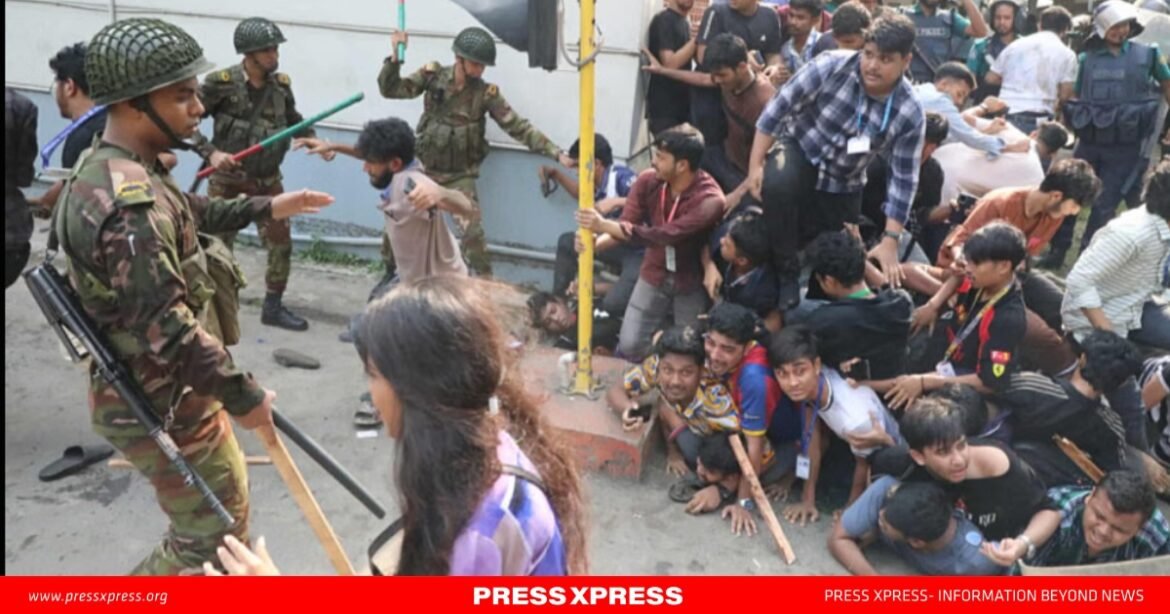A tragic military plane crash near Milestone School and College has become the flashpoint for a rapidly unfolding national crisis in Bangladesh. Allegations that the government is concealing the true casualty figures are gaining momentum. In response, the violent crackdown on students by security forces has triggered widespread outrage across the country. What began as a tragedy has quickly escalated, as students, teachers, and witnesses accuse the authorities of hiding the true scale of the disaster and brutally silencing those demanding the truth.
Disputed Death Toll and Eyewitness Testimonies
On Monday afternoon, a military F-7 jet crashed into the permanent campus of Milestone School and College in Uttara. The Bangladesh Army has officially confirmed 31 fatalities and 165 injuries. But school authorities and rescue workers say the real number is significantly higher, with at least 120 people—mostly students, teachers, and staff—killed instantly.
School teacher Shafayet Faiyaz, who was involved in the rescue effort, posted a detailed account on Facebook. He claimed to have recovered 15 to 20 charred bodies from the classrooms, only to be beaten by army personnel after challenging the official figures being reported in the media. Faiyaz alleges he was later dragged to a building on campus and assaulted again—this time nearly strangled with his own scarf.
Students say they had prepared a list of the deceased and injured, but were warned by military officers not to release it. According to accounts by students and teachers, media reports continued to cite a much lower death toll well after the actual numbers had surged. The school’s principal, Ziaul Alam, was reportedly attacked by army personnel after confronting them about the alleged cover-up.
Violent Crackdown on Student Protesters

Anger boiled over on Tuesday when thousands of students took to the streets and marched towards the Secretariat, demanding transparency and accountability. Protesters were met with a heavy-handed response. More than 400 police officers were deployed to disperse the crowds and rescue two government advisers who had faced student anger during an earlier visit to the school.
Clashes broke out as students attempted to force their way into the Secretariat. Security forces used batons, sound grenades, and allegedly fired live rounds to suppress the protest. At least 40 students were injured and taken to Dhaka Medical College Hospital. An ambulance and several motorcycles were vandalized during the chaos. Some demonstrators claimed they were assaulted inside the premises.
Videos on social media showed students, confined in the school dormitory overnight, calling for help and accusing the army of intimidation. Eyewitness reports also suggest that the army confined residential students after the crash, and assaulted faculty members who spoke to the press. The authorities have not responded directly to these allegations.
Mounting Political Pressure and Public Outrage
In the wake of the protest, the government removed Siddiq Zubair, the senior secretary of the Ministry of Education. But the students’ demands go further. They are calling for the resignation of both the education adviser and the current secretary, whom they accuse of collaborating with the army to suppress the truth.
Protesters also released a six-point list of demands, which includes publishing a transparent list of the deceased, missing, and injured, as well as launching an independent investigation into the incident and subsequent crackdown.
Meanwhile, local journalists and human rights activists are raising alarms over press freedom and the state’s response to civil unrest. ATN Bangla reporter Ali Asgar Emon confirmed attempts by authorities to minimize the death toll. Some government-aligned officials, including education adviser Asif Mahmud, have reportedly threatened students with “dire consequences” if protests continue.
As public pressure builds, the Yunus administration faces a critical test of its credibility and crisis management. For now, a deepening mistrust between citizens and the state is leaving many in Bangladesh demanding one thing: the truth.


